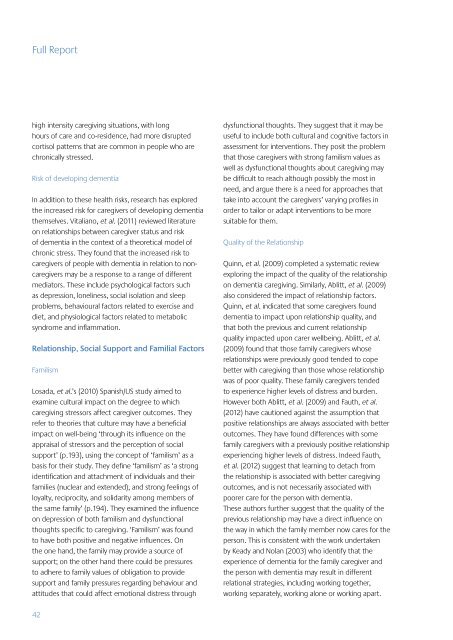The experiences needs and outcomes for carers of people with dementia
RSAS-ADS-Experiences-needs-outcomes-for-carers-of-people-with-dementia-Lit-review-2016
RSAS-ADS-Experiences-needs-outcomes-for-carers-of-people-with-dementia-Lit-review-2016
Create successful ePaper yourself
Turn your PDF publications into a flip-book with our unique Google optimized e-Paper software.
Full Report<br />
high intensity caregiving situations, <strong>with</strong> long<br />
hours <strong>of</strong> care <strong>and</strong> co-residence, had more disrupted<br />
cortisol patterns that are common in <strong>people</strong> who are<br />
chronically stressed.<br />
Risk <strong>of</strong> developing <strong>dementia</strong><br />
In addition to these health risks, research has explored<br />
the increased risk <strong>for</strong> caregivers <strong>of</strong> developing <strong>dementia</strong><br />
themselves. Vitaliano, et al. (2011) reviewed literature<br />
on relationships between caregiver status <strong>and</strong> risk<br />
<strong>of</strong> <strong>dementia</strong> in the context <strong>of</strong> a theoretical model <strong>of</strong><br />
chronic stress. <strong>The</strong>y found that the increased risk to<br />
caregivers <strong>of</strong> <strong>people</strong> <strong>with</strong> <strong>dementia</strong> in relation to noncaregivers<br />
may be a response to a range <strong>of</strong> different<br />
mediators. <strong>The</strong>se include psychological factors such<br />
as depression, loneliness, social isolation <strong>and</strong> sleep<br />
problems, behavioural factors related to exercise <strong>and</strong><br />
diet, <strong>and</strong> physiological factors related to metabolic<br />
syndrome <strong>and</strong> inflammation.<br />
Relationship, Social Support <strong>and</strong> Familial Factors<br />
Familism<br />
Losada, et al.’s (2010) Spanish/US study aimed to<br />
examine cultural impact on the degree to which<br />
caregiving stressors affect caregiver <strong>outcomes</strong>. <strong>The</strong>y<br />
refer to theories that culture may have a beneficial<br />
impact on well-being ‘through its influence on the<br />
appraisal <strong>of</strong> stressors <strong>and</strong> the perception <strong>of</strong> social<br />
support’ (p.193), using the concept <strong>of</strong> ‘familism’ as a<br />
basis <strong>for</strong> their study. <strong>The</strong>y define ‘familism’ as ‘a strong<br />
identification <strong>and</strong> attachment <strong>of</strong> individuals <strong>and</strong> their<br />
families (nuclear <strong>and</strong> extended), <strong>and</strong> strong feelings <strong>of</strong><br />
loyalty, reciprocity, <strong>and</strong> solidarity among members <strong>of</strong><br />
the same family’ (p.194). <strong>The</strong>y examined the influence<br />
on depression <strong>of</strong> both familism <strong>and</strong> dysfunctional<br />
thoughts specific to caregiving. ‘Familism’ was found<br />
to have both positive <strong>and</strong> negative influences. On<br />
the one h<strong>and</strong>, the family may provide a source <strong>of</strong><br />
support; on the other h<strong>and</strong> there could be pressures<br />
to adhere to family values <strong>of</strong> obligation to provide<br />
support <strong>and</strong> family pressures regarding behaviour <strong>and</strong><br />
attitudes that could affect emotional distress through<br />
dysfunctional thoughts. <strong>The</strong>y suggest that it may be<br />
useful to include both cultural <strong>and</strong> cognitive factors in<br />
assessment <strong>for</strong> interventions. <strong>The</strong>y posit the problem<br />
that those caregivers <strong>with</strong> strong familism values as<br />
well as dysfunctional thoughts about caregiving may<br />
be difficult to reach although possibly the most in<br />
need, <strong>and</strong> argue there is a need <strong>for</strong> approaches that<br />
take into account the caregivers’ varying pr<strong>of</strong>iles in<br />
order to tailor or adapt interventions to be more<br />
suitable <strong>for</strong> them.<br />
Quality <strong>of</strong> the Relationship<br />
Quinn, et al. (2009) completed a systematic review<br />
exploring the impact <strong>of</strong> the quality <strong>of</strong> the relationship<br />
on <strong>dementia</strong> caregiving. Similarly, Ablitt, et al. (2009)<br />
also considered the impact <strong>of</strong> relationship factors.<br />
Quinn, et al. indicated that some caregivers found<br />
<strong>dementia</strong> to impact upon relationship quality, <strong>and</strong><br />
that both the previous <strong>and</strong> current relationship<br />
quality impacted upon carer wellbeing. Ablitt, et al.<br />
(2009) found that those family caregivers whose<br />
relationships were previously good tended to cope<br />
better <strong>with</strong> caregiving than those whose relationship<br />
was <strong>of</strong> poor quality. <strong>The</strong>se family caregivers tended<br />
to experience higher levels <strong>of</strong> distress <strong>and</strong> burden.<br />
However both Ablitt, et al. (2009) <strong>and</strong> Fauth, et al.<br />
(2012) have cautioned against the assumption that<br />
positive relationships are always associated <strong>with</strong> better<br />
<strong>outcomes</strong>. <strong>The</strong>y have found differences <strong>with</strong> some<br />
family caregivers <strong>with</strong> a previously positive relationship<br />
experiencing higher levels <strong>of</strong> distress. Indeed Fauth,<br />
et al. (2012) suggest that learning to detach from<br />
the relationship is associated <strong>with</strong> better caregiving<br />
<strong>outcomes</strong>, <strong>and</strong> is not necessarily associated <strong>with</strong><br />
poorer care <strong>for</strong> the person <strong>with</strong> <strong>dementia</strong>.<br />
<strong>The</strong>se authors further suggest that the quality <strong>of</strong> the<br />
previous relationship may have a direct influence on<br />
the way in which the family member now cares <strong>for</strong> the<br />
person. This is consistent <strong>with</strong> the work undertaken<br />
by Keady <strong>and</strong> Nolan (2003) who identify that the<br />
experience <strong>of</strong> <strong>dementia</strong> <strong>for</strong> the family caregiver <strong>and</strong><br />
the person <strong>with</strong> <strong>dementia</strong> may result in different<br />
relational strategies, including working together,<br />
working separately, working alone or working apart.<br />
42


